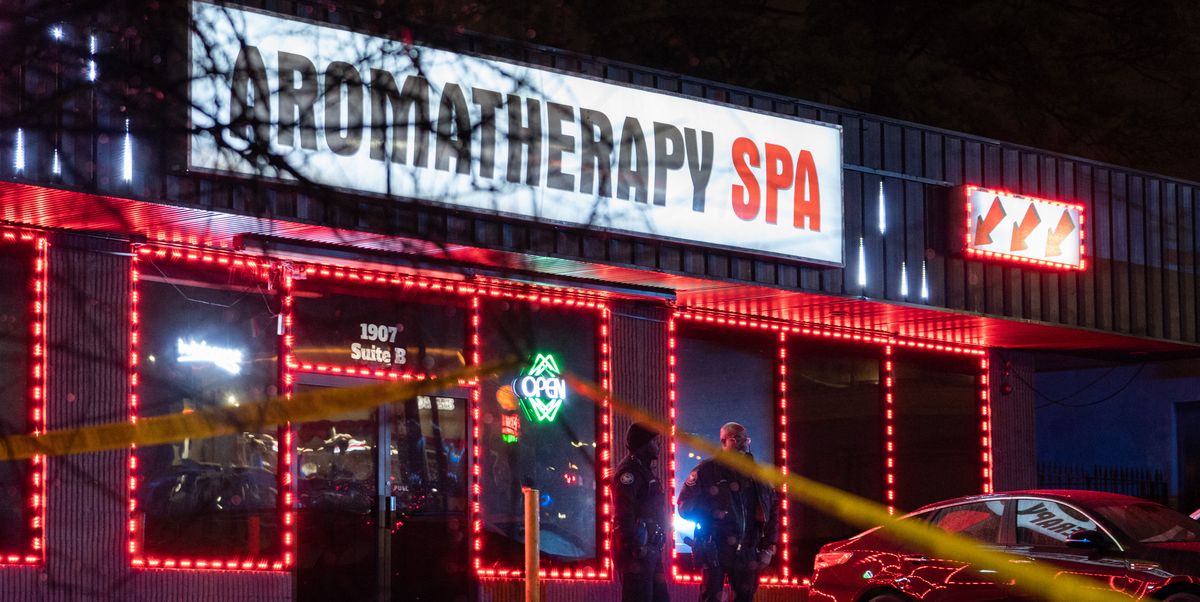
ELIJAH NOUVELAGEGetty Images
On Tuesday evening, eight people were shot dead at three different massage parlors near Atlanta, Georgia. According to the New York Times, six of the eight people were Asian, and seven were women.
This shooting comes after months of violent attacks against Asian and Asian Americans, several of which have gone viral on social media. The organization Stop AAPI Hate formed in March 2020 to track reports of violence against Asian Americans and Pacific Islanders “in response to the alarming escalation in xenophobia and bigotry resulting from the COVID-19 pandemic.” While the organization has stated that “few details about these shootings have been released, including whether or not they were motivated by hate,” since last March, it has received nearly 3,800 reports of anti-Asian hate from across the nation.
Below, what you need to know about this most recent act of violence and how you can continue to support Asians, Asian Americans, and the AAPI community.
What happened on March 16
Per the Times, the first shooting took place at Young’s Asian Massage and was reported to police around 5 p.m. Four people were killed and a Hispanic man was injured. Less than an hour later, officers went to Gold Spa, about 30 miles away, to respond to a robbery and found three more women dead with gunshot wounds. At the same time officers were at Gold Spa, Atlanta police said they received a report about Aromatherapy Spa across the street. There, they found another woman who had been shot. The 21-year-old suspect, who is white, is now in custody, and a spokesman for the Atlanta field office told the Times that the FBI is assisting in the investigation. According to CNN, police said, due to video evidence, “it is extremely likely” that the same person was responsible for all three shootings.
The Atlanta Journal-Constitution reports that authorities have yet to release the identities of the victims, though an official from the South Korean Consulate in Atlanta confirmed to the Times that four of the people were Korean.
The response
Georgia politicians have tweeted in response to Tuesday’s shooting, including Gov. Brian Kemp and Sen. Raphael Warnock:
This content is imported from Twitter. You may be able to find the same content in another format, or you may be able to find more information, at their web site.
Several Asian American members of Congress also responded to the attack. Congresswoman Grace Meng wrote on Twitter: “My heart breaks for those we lost in these senseless shootings. And this is all the more painful because AAPIs have spent the last year telling you that our communities were in danger. We cannot move forward — we cannot heal — until our country reckons with & stops AAPI hate.”
This content is imported from Twitter. You may be able to find the same content in another format, or you may be able to find more information, at their web site.
This content is imported from Twitter. You may be able to find the same content in another format, or you may be able to find more information, at their web site.
This content is imported from Twitter. You may be able to find the same content in another format, or you may be able to find more information, at their web site.
Stop AAPI Hate released a statement on Tuesday, saying: “The reported shootings of multiple Asian American women today in Atlanta is an unspeakable tragedy — for the families of the victims first and foremost, but also for the Asian American community, which has been reeling from high levels of racist attacks over the course of the past year.”
This content is imported from Twitter. You may be able to find the same content in another format, or you may be able to find more information, at their web site.
President Barack Obama also tweeted: “Although the shooter’s motive is not yet clear, the identity of the victims underscores an alarming rise in anti-Asian violence that must end.” He continued, “Yesterday’s shootings are another tragic reminder that we have far more work to do to put in place commonsense gun safety laws and root out the pervasive patterns of hatred and violence in our society.”
This content is imported from Twitter. You may be able to find the same content in another format, or you may be able to find more information, at their web site.
This content is imported from Twitter. You may be able to find the same content in another format, or you may be able to find more information, at their web site.
How to support Asians, Asian Americans, and the AAPI community
If you’re looking for places to donate, there are a number of organizations that work to combat anti-Asian violence and provide ongoing support to local AAPI communities:
- The Asian American Advocacy Fund works to “advocate for the civil and human rights of Asian Americans, Pacific Islanders, and Native Hawaiians in Georgia.”
- The National Asian Pacific American Women’s Forum works to “build a movement for social, political, and structural change for Asian American and Pacific Islander (AAPI) women and girls,” including fighting for economic and racial justice.
- AAPI Women Lead “aims to strengthen the progressive political and social platforms of Asian and Pacific Islander communities in the US through the leadership of self-identified AAPI women and girls” with the goal of ending violence within and against AAPI communities.
- The Asian Americans Advancing Justice – Asian Law Caucus is a “legal and civil rights organization serving the low-income Asian Pacific American communities.”
- The Asian Mental Health Collective works to “to normalize and de-stigmatize mental health within the Asian community” by making mental health support easily available and accessible.
- You can also donate to Stop AAPI Hate here, and find even more organizations here, via New York magazine.
Continue to speak out against anti-Asian violence, hate, and harassment, both on social media and within your own social circles. The organization Hollaback! has also partnered with Asian Americans Advancing Justice to provide free bystander intervention training and conflict de-escalation training to stop anti-Asian and xenophobic harassment. You can sign up here.
This content is created and maintained by a third party, and imported onto this page to help users provide their email addresses. You may be able to find more information about this and similar content at piano.io
